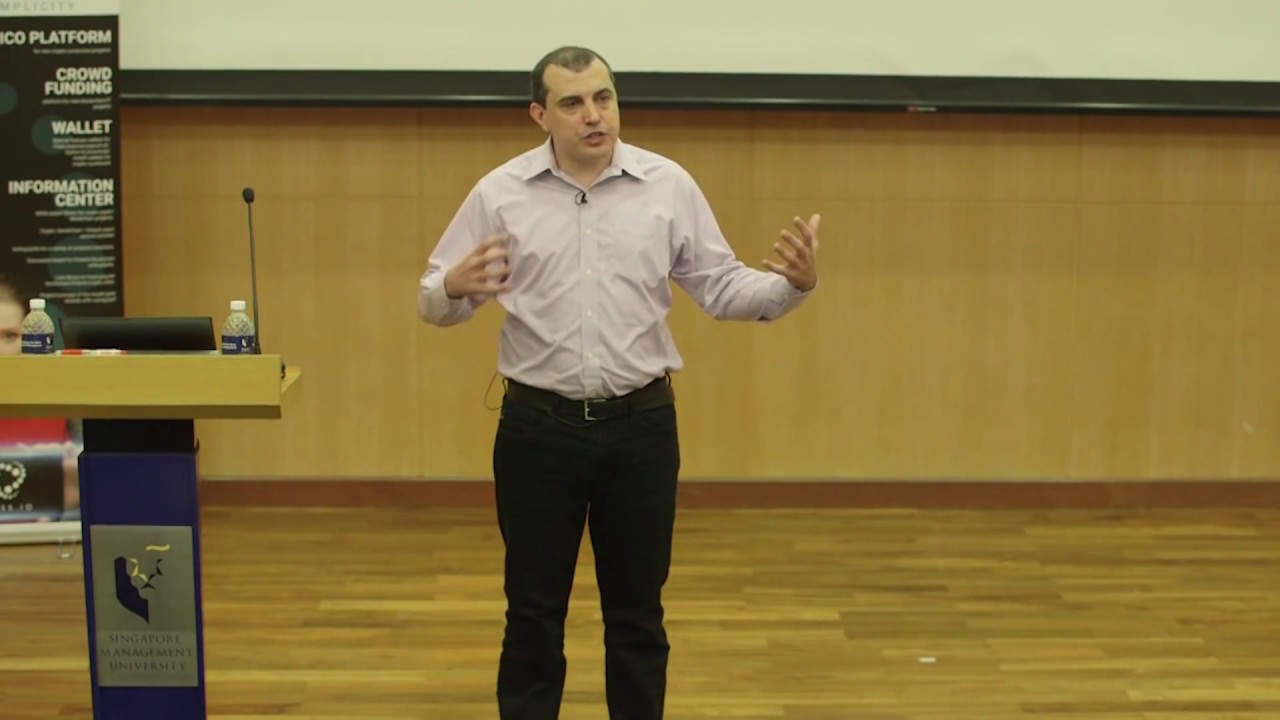In this talk, Andreas speaks about the ongoing clash between hardware and software development (instead of “East vs. West”) within the emerging culture of trustware.
This talk took place on March 20th 2017 at the Singapore Management University for the Singapore Bitcoin & Ethereum meetups: https://www.meetup.com/BitcoinSingapore/events/237307480/
Full talk transcript by Open Transcripts: http://opentranscripts.org/transcript/hardware-software-trustware/
RELATED:
Bubble Boy and the Sewer Rat – https://youtu.be/810aKcfM__Q
The dangers of hard forks in protocol evolution – https://youtu.be/vxEHRvhJKvA
Hard forks & the cultural mulligan – https://youtu.be/KT-7APasANI
The Core roadmap & scaling solutions – https://youtu.be/1MKrsALrM0s
Scaling and the block size debate – https://youtu.be/4IT4s-6T__k
Andreas M. Antonopoulos is a technologist and serial entrepreneur who has become one of the most well-known and well-respected figures in bitcoin.
Follow on Twitter: @aantonop https://twitter.com/aantonop
Website: https://antonopoulos.com/
He is the author of two books: “Mastering Bitcoin,” published by O’Reilly Media and considered the best technical guide to bitcoin; “The Internet of Money,” a book about why bitcoin matters.
THE INTERNET OF MONEY, v1: https://www.amazon.co.uk/Internet-Money-collection-Andreas-Antonopoulos/dp/1537000454/ref=asap_bc?ie=UTF8
MASTERING BITCOIN: https://www.amazon.co.uk/Mastering-Bitcoin-Unlocking-Digital-Cryptocurrencies/dp/1449374042
Subscribe to the channel to learn more about Bitcoin & open blockchains!
Music: “Unbounded” by Orfan (https://www.facebook.com/Orfan/)
Outro Graphics: Phneep (http://www.phneep.com/)
Outro Art: Rock Barcellos (http://www.rockincomics.com.br/)
source











Gangsta Shit
Andreas could be Satoshi Nakamoto. Discuss
4:00 that Samsung joke.
kool vid
Amazingly transformative!
This is another golden video from Andreas…..what an absolute GEM.
It is not necessarily software vs hardware, its users vs hardware. Software developers are only as good as the users that adopt such software, there are no software gatekeepers to bitcoin. Only users that chose to run a certain iteration of software.
On chain scaling is something that has to be carried, forever. Off chain scaling does not.
Miners best interest is to keep scaling on-chain so they can get a fee from every transaction. But this comes at a cost, a massive block chain that could limit users ability to validate transactions themselves, and push reliance on to third parties to host the blockchain and validate transactions.
The users best interest is to use second layer (lightning) so they only have to pay 1 fee to open a payment channel. (Lightning fees are several order of magnitude smaller than on-chain fees). Users can also host the blockchain themselves and thus validate themselves.
Math time: 1 mb blocks average around 3 tx/sec when they're full. VISA processed 141 billion tx in 2016. That is 4471 tx/sec! We would need 1.49 GB blocksize to process this, and it would grow blockchain by 214 GB every day, and 78 TB every year!! I live in a first world country, and my ISP limits my traffic to 1TB per month. As you can see, as privileged as I am, on chain scaling does not work unless you want to give up the decentralized nature of bitcoin. Now eventually, even if all transactions are on lightning, the block size will need to be greater than 1MB just so people can open and close payment channels. And at that time, community consensus to hard fork will be much easier to obtain. A small block size also makes packet sniffing/analysis harder to conduct. If a rogue nation wants to block their citizens from downloading the blockchain, it will be much harder to detect 1mb every 10 minutes vs 8 or 16 or 1.49GB!
As for security of the blockchain, miners still get fees to open and close payment channels, as well as the block reward until the year 2140. I wouldn't worry about security diminishing. The lightning network potentially has no downsides vs on chain transactions, and has several advantages: Transactions are instant, have extremely low fees, allows micro transactions smaller than 1 satoshi, can be more anonymous than on-chain transactions, and the most important feature: it is still a trust-less peer to peer cash system backed by the economic scarcity of its parent blockchain. Until we see second layer payment channels mature, I doubt we will see an uncontentious hard fork.
I love these stories you tell. I learn so much
Кто-нибудь, пожалуйста, сделайте перевод на русский
Does this video give support to my decision to prefer Litecoin over Bitcoin and Ethereum Classic over Ethereum?…I think so…please correct me if I'm wrong.
what do you think about ripple? why is the market cap catching up to bitcoin so fast
Thanks ,for sharing very smart guy .,learn a lot from you .
Transcript available at http://opentranscripts.org/transcript/hardware-software-trustware/
Thank you!
Great talk.
Best hard fork presentation ever .
Andreas, thank you for your work(!!!!). The insights you share in this video make me even more appreciative of the fact that with regards to Bitcoin, we are watching the unfolding of monumental historical events, one after the other. Even as "just" a user of Bitcoin, I am taking part in those events.
Right on.
Based on the new difficult "trustware" paradigm, do you believe Bitcoin will be able – physically or culturally – to provide fast and cheap transactions, satisfying an ever-increasing demand, well into the future? Seems unlikely. Will Bitcoin, at best, become an elite (slow and expensive) transaction device and (hopefully) store of value? Can off-chain solutions save the day?
Good deep insights as usual! So if the relatively inflexible hardware guys (miners) want bigger blocks and are willing and able to scale up their hardware, why are the fast and flexible software guys (developers) so scared or unwilling to increasing the block size? I can see how a software "upgrade" (SegWit) with all its attendant "maintenance" will really bother the hardware guys (miners). I guess I'm asking were's the trust?
Everything this man says is captivating!
Perfect example of the Hardware cycle in a short video of an original 1980s Apple computer hardware guy. https://youtu.be/pJif4i9NRdI
With regards to old UTX and the need to support old transactions.
If there were a way to consolidate/update old transactions every month or two, the need to maintain old transactions becomes less of a headache. It would also eliminate at least 1/3 to a half of the indexing required for nodes and miners.
Andreas for president! 🙂
BU nerds, Core nerds, it's time to unite. We are not enemies.
ah well, there'd be much less perspective in the bitcoin space without andreas – glad he does what he's doing
Thank u!
Thanks Andreas for your hard work. #Trustware
Another brilliant new insight and point of view from Andreas.
This talk is at the core making the argument that the control of bitcoin should shift from the decentralized free market model that's worked for 8 years and the version of bitcoin described in Satoshi's white paper, to one where a centralized core of technocrats define the rules.
The bitcoin protocol is secured by hardware and more over supports an incentive that shifts the control away from the nodes that perform Proof of Work (the hardware makers) by reducing their efforts to a marginal profit on the cost of the necessary energy to secure the network moving it to the users who pay according to the value they get from the service.
This shift happens over time and is encoded into the immutable rules enforced by PoW that reduces the subsidy given to those who build the hardware. The rule is disruptive and radical, a 50% drop in subsidiary revenue that is designed to encourage competition to build the network hardware, it's known as a halving and happens every 4 years.
Software engenders on the other hand don't have power to change the bitcoin protocol.
Unlike PoW nodes, software engenders are accountable to their employers not bitcoin users.
The hardware manufacturers have to invest $100's of millions to get the security subsidy, and they have to show Proof of Work for the reward.
Their interest is maximize by securing the needed rules that preserve the network they depend on for profit.
Software engineers and technocrats need to use political lobbyists to get the nodes that do PoW to enforce rules that transfer power.
This debate is about who should control bitcoin, it's between the free market or technocrats and their employers. It is not between hardware maker and software developers.
best talk yet, i know the subjects real serious, but i was gigglin all the way thru
… trustware.